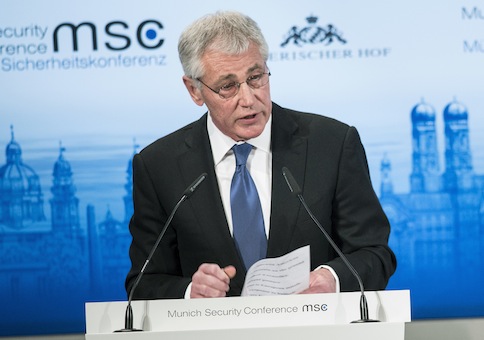Secretary of Defense Chuck Hagel sought to downplay the viability of a U.S. military strike on Iran during an informal chat Tuesday evening at a Washington-area synagogue.
Hagel took a seat on the bima at the Beth El synagogue in Bethesda, Md., for a wide-ranging discussion about Iran, Israel, budget cuts, and other pressing issues facing the Pentagon.
Hagel, who has run into trouble when speaking off the cuff, offered mostly vague answers and avoided delving too deeply into any particular issue.
When asked about Iran’s nuclear pursuit, Hagel said diplomacy is "smarter" than the military option.
"Obviously, the U.S. considers all options and President Obama, and I’ve said, and [Secretary of State John] Kerry has said, and [Vice President Joe] Biden has said, you have to explore and prepare all options," Hagel said.
"I clearly support, if we can find a peaceful, smart way to accomplish that policy [of preventing a nuclear Iran], isn’t that smarter and better than a military solution?" he asked. "Military solutions and options are always part of any equation and that’s part of the role as fundamental as any role for the Department of Defense to always have options for the President of the United States. But he has a lot of tools and instruments and options to use."
When the larger Middle East came up for discussion, Hagel promised to "give you a cogent answer as best I can do."
From Iran to the civil war in Syria to the Israeli-Palestinian peace process, "You can’t separate each of those countries and what’s going on necessarily from the region because these are regional issues," Hagel said.
Each challenge must be tackled in order to bring stability to the Middle East, Hagel said.
"I don’t believe you can disconnect necessarily each of those" issues, he said. There is "overlap between all of those in some way" and "not one of those [issues] is going to bring peace to the Middle East."
Egypt has also posed a challenge to Hagel, who claimed that he has spoken to Egyptian military leader Gen. Abdel Fattah al-Sisi at least "35 times."
"I’ve probably spoken to him more than anyone else in the administration," Hagel said, explaining that the U.S.-Egypt military relationship remains strong.
All of these regional problems must be aggressively confronted, Hagel said.
"When you become isolationist, when you turn your back … there are consequences, there are big time consequences," he said. "We don’t have that option."
At the same time, budgetary cuts are forcing the U.S. military to scale back in certain places. Hagel said that American forces are helping to train allies across the globe so that they can manage security concerns without U.S. assistance.
"We’re doing it everywhere," he said. However, this type of capacity building will not last forever because it "does connote a certain throwback to the colonial days," Hagel said.
The synagogue’s rabbi also asked Hagel a few questions submitted by audience members, including several focusing on Syria and cyber threats.
The synagogue’s rabbi did not ask Hagel about his son Charles Ziller Hagel’s recent possession of marijuana charge.
